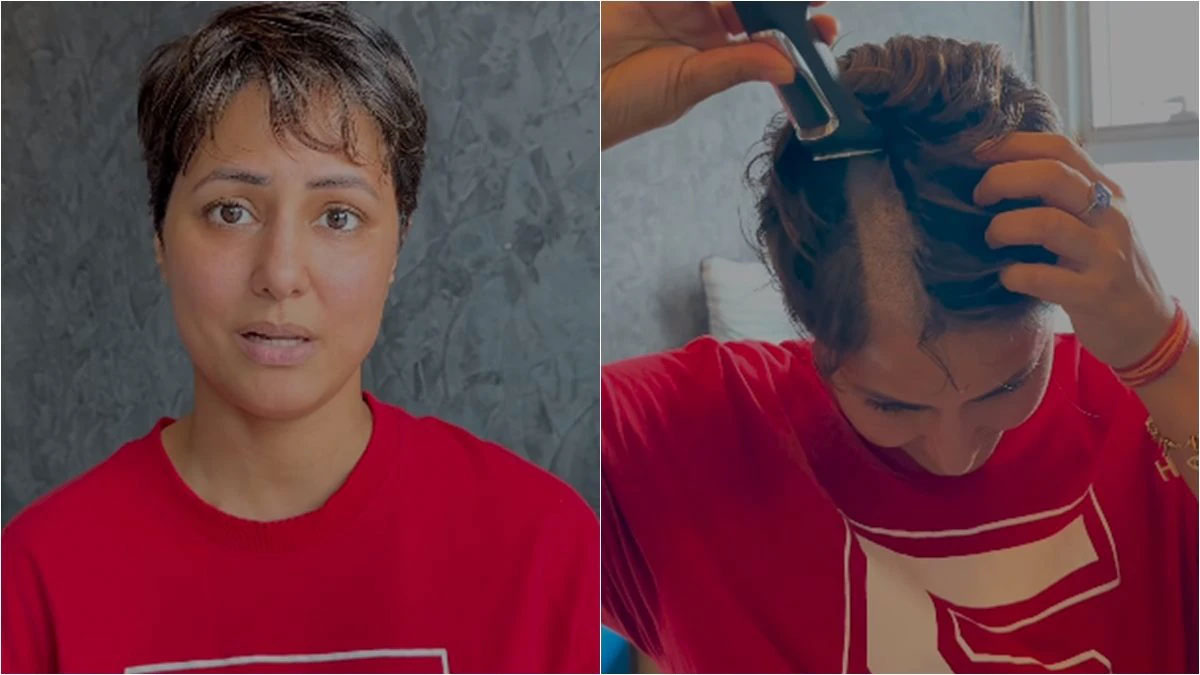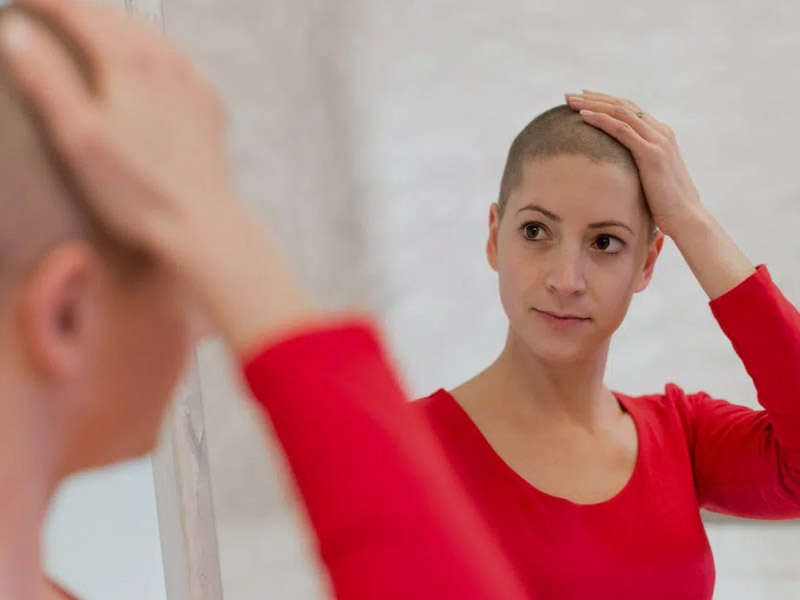
In a brave and deeply personal move, actress Hina Khan has chosen to shave her head amidst her battle with stage 3 breast cancer. Known for her iconic pixie cut, Hina’s decision to embrace a completely bald look is both a testament to her resilience and a strategic step to manage the emotional toll of hair loss during cancer treatment. In this piece, we explore Hina Khan’s journey and offer insights into coping with hair loss, a common and distressing side effect of cancer therapies.
Table of Content:-
Hina Khan’s Emotional Decision
Hina Khan, who has been public about her cancer journey, recently shared a poignant moment on Instagram. Wearing a simple red t-shirt and holding a razor, she announced her decision to shave her head. "Insha Allah...But for now.. The Pixie says Adios. Coz it's time to Buzz IT OFF!" she wrote, reflecting her resolve to take control of her situation.
In her post, Hina expressed how the pixie cut had been a source of joy, but the growing distress over hair loss during chemotherapy prompted her decision. The video accompanying her post showed clumps of hair falling away, underscoring the painful reality many cancer patients face. Hina’s decision to go bald rather than deal with the stress of hair loss each day is a proactive step towards maintaining her mental well-being. She emphasized that by taking charge of what she could control, she hoped to mitigate the emotional strain and focus on staying positive.
View this post on Instagram
Understanding Cancer-Related Hair Loss
Hair loss, medically known as alopecia, is a significant and often distressing side effect of cancer treatments, as per Dr. Rinky Kapoor, Consultant Dermatologist, Cosmetic Dermatologist & Dermato-Surgeon, The Esthetic Clinics. The process of losing one’s hair can be emotionally challenging, affecting self-esteem and mental health. Understanding the causes and ways to cope can provide some relief and preparation.
Causes of Hair Loss in Cancer Patients
Cancer treatments, particularly chemotherapy and radiation therapy, target rapidly dividing cells, which include not only cancer cells but also healthy cells in the hair follicles. This damage disrupts normal hair growth, leading to hair loss. Typically, hair loss begins within two weeks of starting chemotherapy and can continue throughout treatment and for a period afterward. Radiation therapy may cause localized hair loss in the treated area.
Also Read: Radhika Madan Open To Opting For Fillers; What You Should Know Before Getting Facial Fillers
Coping Strategies for Hair Loss
Allow Yourself Time to Adjust
Accepting hair loss can be a gradual process. It’s normal to feel upset, and it’s important to give yourself permission to grieve the changes in your appearance. Remember that hair loss is usually temporary, and hair will typically begin to regrow once treatment is completed.
Affirm Your Identity
Hair loss can make you feel disoriented and self-conscious. Remind yourself that despite physical changes, your essence remains unchanged. Focus on your inner qualities and strengths, and celebrate the person you are beyond your appearance.

Prepare Ahead of Time
Before starting treatment, consult with your doctor about the likelihood of hair loss. Consider meeting with a stylist who understands cancer-related hair loss for advice. Preparing in advance can help you adapt more smoothly when hair loss occurs.
Consider a Shorter Haircut
Cutting your hair short before treatment begins can make the transition less jarring. A short haircut or shaving your head early can reduce the emotional impact of seeing large amounts of hair fall out at once.
Handle Your Hair Gently
Use a soft brush or comb and mild shampoo to minimize hair breakage. Avoid harsh treatments such as dyes or perms, and be gentle when drying your hair to reduce stress on your scalp.
Protect Your Scalp
Keep your scalp safe from sunburn and cold weather. Use sunscreen to protect your scalp from sun damage, and wear a hat or scarf in colder climates. A satin pillowcase can also prevent irritation while sleeping.
Emphasize Other Features
Enhance your appearance by focusing on makeup, skincare, and other personal grooming practices. This can help boost your self-esteem and divert attention from hair loss.
Pamper Yourself
Engage in activities that bring joy and relaxation. Whether it’s a hobby, reading, or a spa day, self-care can help manage stress and improve your mood.
Maintain a Healthy Lifestyle
Adopting a nutritious diet, staying hydrated, and exercising can improve overall well-being. Consult with healthcare professionals to develop a plan that supports your physical and emotional health.
Also Read: Katrina Kaif's Detox Trip To This Austrian Retreat Makes Headlines; Do Detox Retreats Actually Help?
Build a Support Network
Share your experiences with friends, family, or support groups. Connecting with others who understand the challenges of hair loss can provide comfort and practical advice. Consider speaking with a counsellor or psychologist to navigate the emotional aspects of your journey.
Bottomline
Hina Khan’s choice to shave her head amidst her battle with cancer is a powerful statement of control and resilience. While hair loss from cancer treatments is challenging, understanding its causes and exploring coping strategies can make a significant difference. By preparing ahead, focusing on self-care, and seeking support, individuals facing similar challenges can navigate this difficult aspect of their journey with greater strength and grace.
Also watch this video
Read Next
World Lung Cancer Day 2024: What Causes Black Mucus And How It Could Be A Sign Of Lung Cancer
How we keep this article up to date:
We work with experts and keep a close eye on the latest in health and wellness. Whenever there is a new research or helpful information, we update our articles with accurate and useful advice.
Current Version